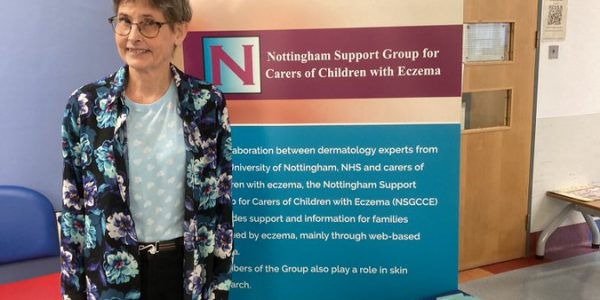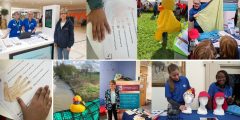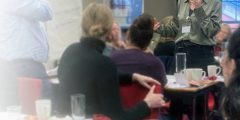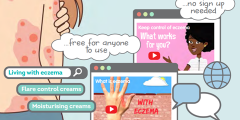When the answers from health research are not what you want to hear
July 19, 2024
When the answers from health research are not what you want to hear, how do you make sense of them? Negative reactions, disagreement with the findings or disengaging with the research team will not make the results of a clinical trial change or disappear. But I have experienced all those responses when sharing results, which …
Getting out and about with Rapid Eczema Trials
June 14, 2024
The ‘traditional route’ for publicising research is to publish the results in scientific and medical journals and talk about what’s been done at scientific conferences. This means a lot of research is only accessible to a limited audience of other researchers and healthcare professionals. But patients and the public are users of research too and …
Being a Rapid Eczema Trials Community Champion
May 24, 2024
In Rapid Eczema Trials, Community Champions are people with experience of eczema, insight, local knowledge and networks who have been prepared to gather and share information in specific communities or localities. With their unique knowledge, Community Champions can act as a bridge between academic research and practical community-based solutions by giving people in their locality …
Addressing the Eczema PSP priorities with citizen science
May 2, 2024
In 2011, the Centre of Evidence Based Dermatology (CEBD) at the University of Nottingham worked with the James Lind Alliance to run an Eczema Priority Setting Partnership (PSP) exercise. The aim was to identify and prioritise uncertainties around how best to treat and manage eczema. Over 500 individuals took part. The exercise identified 14 priority …
Understanding the evidence behind eczema treatments
April 26, 2024
Would you like to know more about the research evidence that supports treatment decisions for people with eczema? If so, this evidence summary from the National Institute for Health and Care Research (NIHR) is a ‘must read’ for you. This article summarises the amazing research that has taken place over the last decade. It has …
Boosting study recruitment by engaging with Be Part of Research
March 28, 2024
We were all so excited when the Eczema Bathing Study opened to recruitment on 29 January. It’s the first study to come out of the Rapid Eczema Trials research programme and is trying to find out whether it’s better to have a shower (or bath) daily or just once or twice a week when you have …
Networking with other citizen science teams
December 18, 2023
In October, Kim Thomas and myself (Rapid Eczema Trials co-leads) attended a networking event and workshop for recently funded NIHR Programme Development Grants in Birmingham. The NIHR is the National Institute for Health and Care Research, which is the NHS research funder. The NIHR are the people funding our Rapid Eczema Trials. All the attendees …
Eczema Care Online – one year on…
August 31, 2023
It’s now been over a year since we first launched the Eczema Care Online website. We thought it was time we gave you an update on how things are going. The Eczema Care Online website has been accessed by over 20,000 people from 157 countries around the world. This is an amazing achievement, but with …
Rapid Eczema Trials: Life of an intern
August 10, 2023
The Rapid Eczema Trials project involves researchers, healthcare professionals and citizen scientists (people with eczema and parents of children with eczema) working together to answer important questions about eczema by designing and running clinical trials together. Being an intern at the Centre of Evidence Based Dermatology (CEBD) is an opportunity that has changed the trajectory …
A new adventure: designing eczema research as a citizen scientist.
May 31, 2023
The RAPID Eczema Trials team involves researchers, healthcare professionals and citizen scientists (people with eczema and parents of children with eczema) working together to answer important questions about eczema by designing and running clinical trials together. Our citizen scientist Kelly Zhang has shared her experience of being involved… Months ago, I was kindly invited to …










